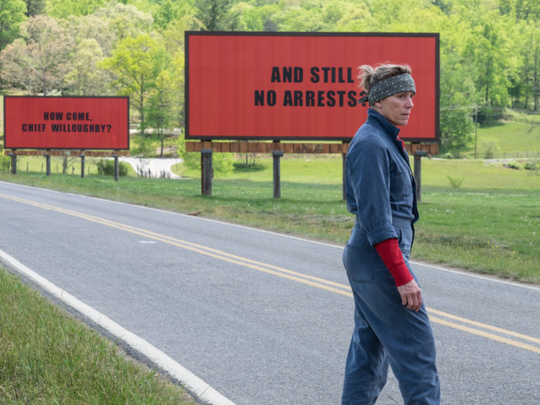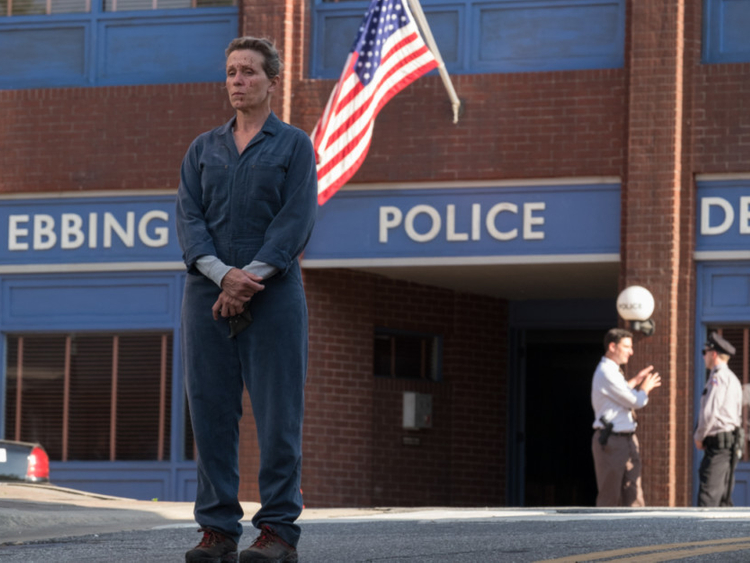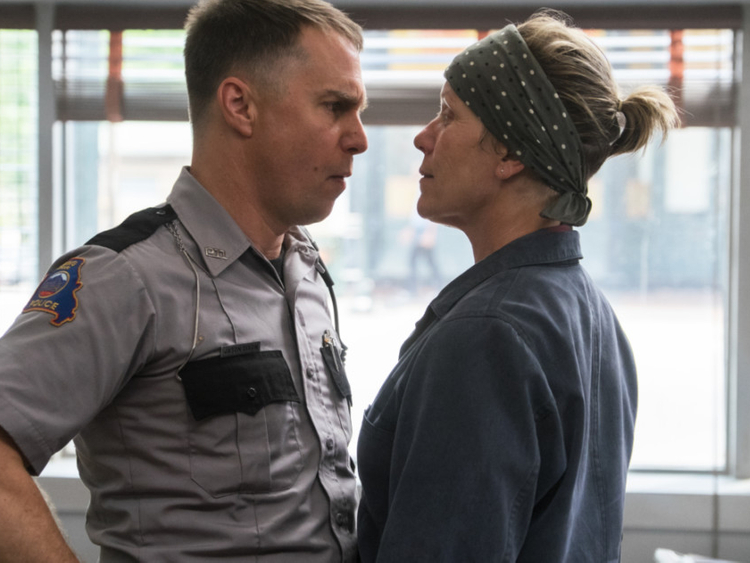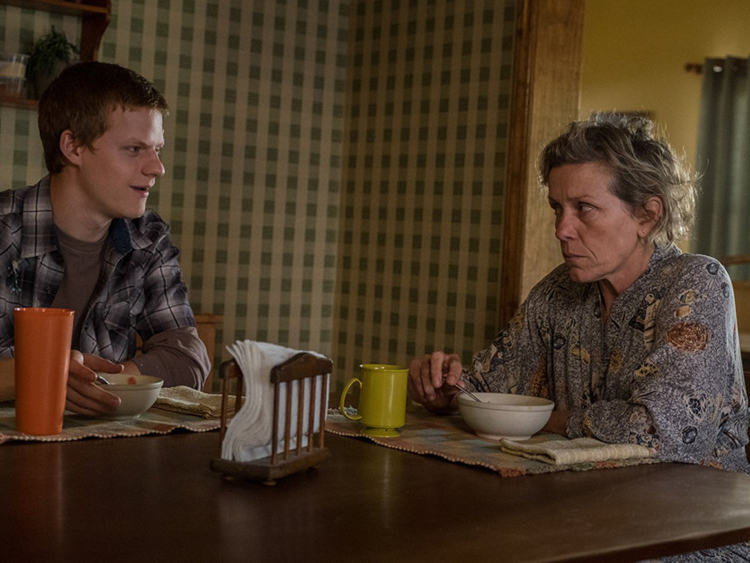
Winners of the Oscar for best actress can pretty much choose what to do next. But, when Frances McDormand won in 1996 — for her performance as an eccentric but unfoolable Minnesota cop in Fargo — she made choices that surprised Hollywood.
The best thing about the award, she told interviewers, was that she was now famous enough to be cast in a Sesame Street video giving tips to children who got lost. Then, at a point where she could have picked any film, she chose to go to the Gate theatre in Dublin for a revival of Tennessee Williams’ A Streetcar Named Desire. She specifically asked the Gate not to mention her Oscar in the programme.
Those decisions suggest an equivocal relationship with movie stardom that may be tested again. McDormand is nominated for best actress for playing a mother who publicly advertises her anger at the failure to catch the murderer of her daughter in Three Billboards Outside Ebbing, Missouri, at this year’s Oscars and the Bafta awards.
“She’s one of the least spoiled of American actors,” says the British producer Rebecca O’Brien, who worked with McDormand on Ken Loach’s 1990 Northern Irish political thriller, Hidden Agenda. “What I love is how ordinary she can be. She plays it so straight down the line: she doesn’t wear makeup and just goes for total honesty.”
Loach agrees: “She looks you in the eye and tells you the truth, which is all you want from an actor, really. I say ‘all you want’, but not a lot of people can do that.”
The police chief in Fargo and the anti-police campaigner in Three Billboards — McDormand’s two defining movie roles, two decades apart — are at very different stages of their lives: Marge is about to give birth, Mildred is grieving her teenage child. But both are self-confident eccentrics in obscure American communities, determined to uncover the truth about a murder. Such women — cleverer, tougher and funnier than the men who underestimate them — perfectly suit an acting style rooted in directness and lack of vanity.
“I was struck by her absolute focus on character,” says Clarke Peters, who plays the Ebbing police chief in Three Billboards. “And her invention and intelligence in building that character. When she walks across the road when she leaves the police station, she has a swagger that she described as her ‘John Wayne walk.’ I like that physical invention.”
EARLY YEARS
Born in 1957 in Illinois, McDormand was adopted at the age of 18 months by Noreen McDormand, a nurse, and her husband, the Rev Vernon McDormand, a preacher with an evangelical sect called Disciples of Christ. Because her father specialised in re-energising failing congregations, Frances and two adopted siblings had a peripatetic childhood around the US.
“We were the preacher’s kids, so wherever we lived my mother felt we just had to keep up appearances a little bit more,” the actor has remembered, but stressed that her father, in the pulpit, was more of a heaven-warm than hellfire preacher.
An adopted child with a dad who addresses crowds for a living might be thought well prepared for two of the most important elements of acting: exploration of identity and vocal projection. And “Fran” — as she always is to friends and colleagues — showed dramatic talent at school before studying theatre at Bethany College in West Virginia and postgraduate studies at Yale.
Throughout her career, her preferred film-makers have been the Coen brothers, perhaps unsurprisingly as they comprise her husband Joel and brother-in-law Ethan. Fargo is one of six of their movies — starting with Blood Simple (1984) — in which she has had leading or major roles, plus an uncredited walk-on and talk-over in two others. Significant work with non-family directors includes Robert Altman’s Short Cuts (1993) and Wes Anderson’s Moonrise Kingdom (2012) and now Martin McDonagh, writer-director of Three Billboards.
Hidden Agenda stills stands as something of a surprise in the CV. Her casting came about because Loach and O’Brien had attracted US backers, who insisted on a known American actor for the role of the human rights lawyer Ingrid Jessner, rather than Loach’s preferred unknown or non-professional performers.
On location in Northern Ireland, O’Brien and Loach were impressed by how easily McDormand adapted to their unrehearsed, semi-improvised shooting style, in which the performers often don’t know what is going to happen in a scene until it does. McDormand’s shocked reaction during a sequence when someone is abducted is genuine; she hadn’t been told the other actor would be hustled away by thugs.
“It was a completely different way of working for her,” says Loach. “But she got it very quickly. I’d say: ‘You’re not playing someone else. Imagine it’s you in this situation. What would you do?’ She’s got good instincts. We didn’t talk about acting at all.”
CAREER GROWTH
Almost three decades on, Loach and the Coens still exchange seasonal greetings at the end of December. O’Brien remembers that when she and Loach made their only Los-Angeles-based movie, Bread and Roses, in 1999, feeling like odd people out in Hollywood, “Fran and Joel were unbelievably welcoming to us. She’s a very generous person.”
McDormand tends to make movies only when she really wants to, happy to take long gaps to be with her family — she and Joel have an adopted son, Pedro — or to appear on stage.
Whereas many actors remain shadowed by their early hits, McDormand’s career trajectory suggests continual maturing and improvement. In the last seven years she has won a Tony (for David Lindsay-Abaire’s Good People, on Broadway) and an Emmy (for the title role in a TV adaptation of Elizabeth Strout’s book Olive Kitteridge). This makes her one of only 14 women to have won the highest American acting prizes in cinema, theatre and TV.
Peters believes McDormand’s work in theatre increases her power on screen: “You can tell she’s done stage work because you can feel her energy in the scene. There are some actors who give everything to the camera. You’re on set with them but don’t even feel as if you’re in the same room because they’re playing straight to the camera. She gives the energy to whoever she’s playing with. She’s really in it.”
He remembers her as “fun, a gas to be with. My wife and I had a great time socialising with her during filming.” Loach, an exacting judge of character, considers her “a really nice person, a good team-player”. There also seems to be a sharper side: McDormand has said her husband has learned to interrupt or distract her on social occasions when she seems about to berate an actor for surgically enhancing her face.
For McDormand, though, that would be an off-screen extension of the truth-telling she aims for as an actor. In an interview after her 1996 Oscar win, she drew a distinction that can be seen to have guided her career: “Movie stars have careers — actors work, and then they don’t work, and then they work again.”
















